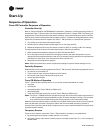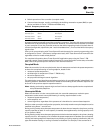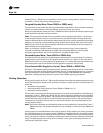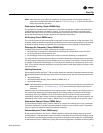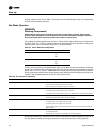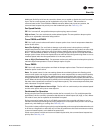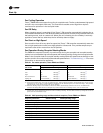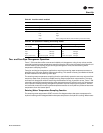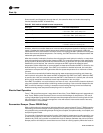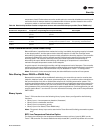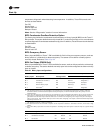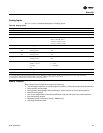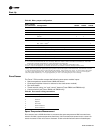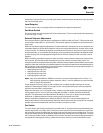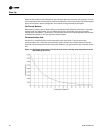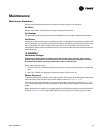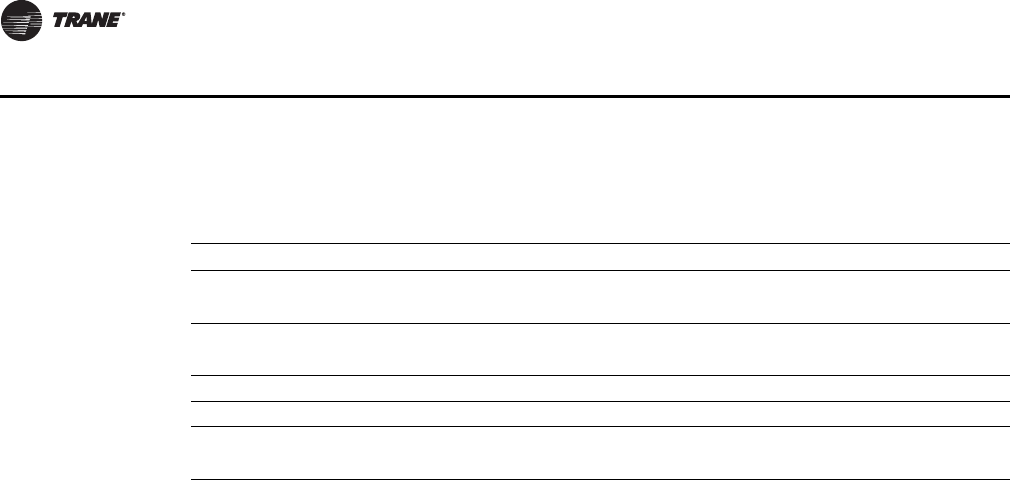
56 BCXC-SVX01B-EN
Start-Up
flows normally and frequently through the coil, the controller does not invoke the sampling
function because the EWT is satisfactory.
However, when the controller detects an incorrect water temperature based on heating or cooling
mode, it invokes the entering water temperature sampling function. For example, when the
measured EWT is too cool to heat or too warm to cool. For cooling the EWT needs to be five degrees
below the measured space temperature. For heating, the EWT should be five degrees above the
measured space temperature.
After the controller invokes the function, the unit opens the main hydronic valve for no more than
three minutes before considering the measured EWT. The controller allows an initial stabilization
period, equal to 30 seconds plus 1/2 the valve stroke time, to flush the coil. Once the temperature
stabilization period expires, the controller compares the EWT against the effective space
temperature (either hardwired or communicated) to determine whether the EWT is correct for the
desired heating or cooling mode. If the EWT is not usable for the desired mode, the controller
continues to compare the EWT against the effective space temperature for a maximum of three
minutes.
The controller automatically disables the entering water temperature sampling and closes the
main hydronic valve when the measured EWT exceeds the high EWT limit (110°F). When the EWT
is warmer than 110°F, the controller assumes the EWT is hot because it is unlikely the coil would
drift to a high temperature unless the actual loop temperature was very high.
If the EWT is unusable—too cool to heat or too warm to cool—the controller closes the hydronic
valve and waits 60 minutes before initializing another sampling. If the controller determines the
EWT is valid for heating or cooling, it resumes normal heating/cooling control and effectively
disables entering water temperature sampling until it is required.
Electric Heat Operation
Tracer™ ZN controllers support 1-stage electric heat. Also, Tracer ZN520 supports 2-stage electric
heat. Tracer ZN520 cycles the electric heat to control the discharge air temperature. The rate of
cycling is dependent upon the load in the space and the temperature of the incoming fresh air from
the economizer (if any). Two-pipe changeover units with electric heat use the electric heat only
when hot water is not available.
Economizer Damper (Tracer ZN520 Only)
With a valid outdoor air temperature (either hardwired or communicated), Tracer™ ZN520 uses the
modulating economizer damper as the highest priority cooling source. Economizer operation is
only possible using a modulating damper during the occupied, occupied standby, unoccupied, and
occupied bypass modes.
The controller initiates the economizer function if the fresh air temperature is cold enough for use
as free cooling capacity. If the fresh air temperature is less than the economizer enable setpoint
(absolute dry bulb), the controller modulates the fresh air damper (between the active minimum
damper position and 100%) to control the amount of fresh air cooling capacity. When the fresh air
Table 25. Unit mode as related to water temperature
Unit type EWT sensor required? Coil water temperature
2-pipe changeover Yes • Can cool if: space temp - EWT ≥ 5°F
• Can heat if: EWT - space temp ≥ 5°F
4-pipe changeover Yes • Can cool if: space temp - EWT ≥ 5°F
• Can heat if: EWT - space temp ≥ 5°F
2-pipe heating only No Hot water assumed
2-pipe cooling only No Cold water assumed
4-pipe heat/cool No • Cold water assumed in main coil
• Hot water assumed in auxiliary coil



